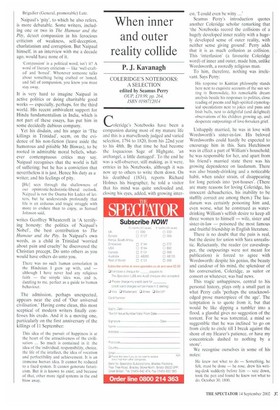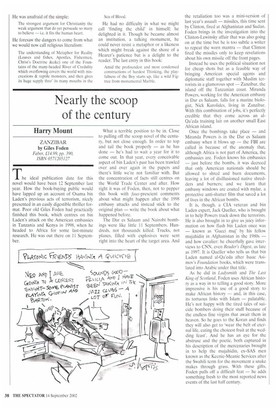When inner and outer reality collide
P. J. Kavanagh
COLERIDGE'S NOTEBOOKS: A SELECTION edited by Seamus Perry OUP, £19.99, pp. 264, ISBN 0198712014 Coleridge's Notebooks have been a companion during most of my mature life and this is a marvellously judged and varied selection, 1794 to 1820, from his 22nd year to his 48th. By that time he had become the loquacious Sage of Highgate, 'an archangel, a little damaged'. To the end he was a self-observer, still making, as it were, entries in his Notebooks, although it was now up to others to write them down. On his deathbed (1834), reports Richard Holmes his biographer, he told a visitor that his mind was quite unclouded and, closing his eyes, added, with growing inter
est. 'I could even be witty ...'
Seamus Perry's introduction quotes another Coleridge scholar remarking that 'the Notebooks record the collisions of a hugely developed inner reality with a hugely developed sense of outer reality, with neither sense giving ground'. Perry adds that it is as much collusion as collision. This 'interfusion' (a favourite Coleridge word) of inner and outer, made him, unlike Wordsworth, a rootedly religious man.
To him, therefore, nothing was irrelevant. Says Perry:
His response to Kantian philosophy stands here next to exquisite accounts of the sun setting in Borrowdalc, his remarkable dream analysis beside his responses to politics, close reading of poems and high-spirited etymological speculations next to jokes and puns and Irish bulls, next to delightful {and delighted) observations of his children growing up, and desperate outpourings of love-forsaken grief.
Unhappily married, he was in love with Wordsworth's sister-in-law. His beloved Wordsworths could hardly be expected to encourage him in this. Sara Hutchinson was in effect a part of William's household: he was responsible for her, and apart from his friend's married state there was his growing dependence on laudanum. There was also brandy-drinking and a noticeable habit, when under strain, of disappearing for long periods into 'pot-houses'. (There are many reasons for loving Coleridge, his innocent debaucheries, his inability to be stuffily correct are among them.) The laudanum was certainly poisoning him and, even worse, what he construed as waterdrinking William's selfish desire to keep all three women to himself — wife, sister and sister-in-law — poisoned the most famous and fruitful friendship in English literature.
There is no doubt that the pain is real, but the desire for union with Sara unrealistic. Reluctantly, the reader (or eavesdropper, the outpourings were not meant for publication) is forced to agree with Wordsworth: despite his genius, the beauty and candour of his mind, the splendour of his conversation, Coleridge, as suitor or consort or whatever, was bad news.
This tragic unhappiness, central to his personal history, plays only a small part in what Perry calls 'perhaps the unacknowledged prose masterpiece of the age'. The temptation is to quote from it, but that would be like dipping a tumbler into a flood, a glassful gives no suggestion of the torrent. For he was torrential, a mind so suggestible that he was inclined 'to go on from circle to circle till I break against the shore of my Hearer's patience, or have my concentricals dashed to nothing by a snore'.
We recognise ourselves in some of his notes:
He knew not what to do — Something, he felt, must be done — he rose, drew his writing-desk suddenly before him — sate down, took the pen and found he knew not what to do. October 30. 1800.
He was unafraid of the simple:
The strongest argument for Christianity the weak argument that do yet persuade so many to believe — i.e. it fits the human heart.
He foresaw the dangers to come from what we would now call religious literalism:
The understanding of Metaphor for Reality (Loaves and fishes, Apostles, Fishermen, Christ's Doctrine &c&c) one of the Fountains of the many-headed River of Credulity which overflowing covers the world with miscreations & reptile monsters, and then gives its huge supply thro' its many mouths in the Sea of Blood.
He had no difficulty in what we might call 'finding the child' in himself; he delighted in it Though he became almost an institution, a talking monument, he could never resist a metaphor or a likeness which might break against the shore of a Hearer's patience but is a delight to the reader. The last entry in this book:
Amid the profoundest and most condensed constructions of hardest Thinking, the playfulness of the Boy starts up, like a wild Figtree from monumental Marble.











































































 Previous page
Previous page